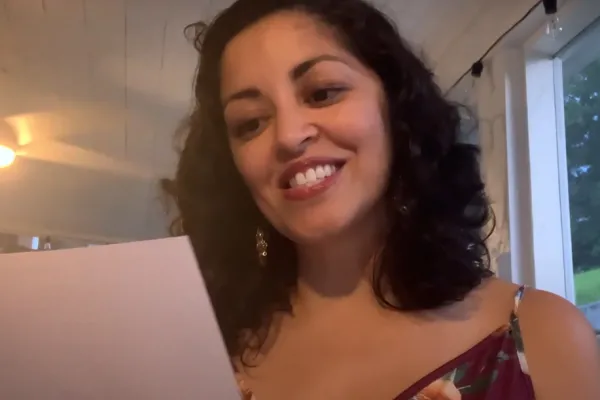‘The Poem I Wish I Had Read’
Smith Arts
Published February 24, 2021
Introducing poetry to young people has always been an objective of the Boutelle-Day Poetry Center, but outreach initiatives can be difficult to pull off, particularly when aiming to connect with high school students.
When the Poetry Center hosts poets for in-person readings and discussions with students, the poets often remark that they held misconceptions of poetry when they were teenagers. “They’d often talk about the poem or teacher or moment that changed everything for them,” says Boutelle-Day Poetry Center director Matt Donovan.
When the COVID-19 pandemic hit, Donovan had to get even more creative with outreach. Hoping to inspire high school students and correct some of these misconceptions about poetry, Donovan created The Poem I Wish I Had Read, a video series that launched in early February, ahead of the Poetry Center’s spring 2021 reading series. “We’re hoping to reach many, many more students through this approach,” says Donovan.
The videos are hosted on the project’s YouTube page and are emailed to teachers in local public schools with the hopes that they will be integrated into lesson plans and used for class discussions.
Each video runs about five minutes and features a current, active poet reading and discussing—as the series title implies—a poem they wish they had read in high school. “Poetry sometimes can be treated as a riddle, as something to solve with a right or wrong answer,” Donovan says, noting that he hopes this project will help change the way young people interact with poetry and apply it to their own lives. “Poems can be a balm—a guide for understanding the world,” he adds.
Identity is a theme that runs through several videos in the series. Many of the poets featured are people of color and/or members of the LGBTQ community, who discuss poems that helped them better understand their identity or their place in the world.
“This poem would have meant so much to me as a teenager because it speaks to the notion of survival and perseverance” says Alison C. Rollins, before reading “won’t you celebrate with me” by Lucille Clifton for the series. “I went to a high school where I had not a single Black teacher,” she adds. “This poem discusses the power of … being in a world where hopefully you can eventually see people who reflect you.”
The project has been a collaborative effort, Donovan says, as two Smith STRIDE scholars have been involved from the onset. “There’s no way I could have pulled this off without them,” he adds with a laugh.
Both members of the class of 2023, Camila Lashbrook and Amelia Burton agree that it has been a fulfilling experience. “Working on the video series has shown me how impactful poetry can be on our everyday lives, especially when it comes to exploring identity,” Lashbrook says.
Burton echoes these sentiments. “I would be watching these incredible poets give fascinating perspectives on wonderful poems” while working on editing the videos, she notes.
With outreach to poets still ongoing, Donovan isn’t sure how many videos the project will have when it’s completed, but he hopes it will leave a lasting impact on students.
“We've had many poets come to visit the Poetry Center and tell students that when they were in high school, they didn't know that a poet could be someone who wasn't a white man who's been dead for centuries,” Donovan says. “I think the project will expand teenage readers’ sense of what a poem might be, and also who a poet is.”
Poet Aimee Nezhukumatathil reads and discusses “Wedding Cake” by Naomi Shihab Nye.
